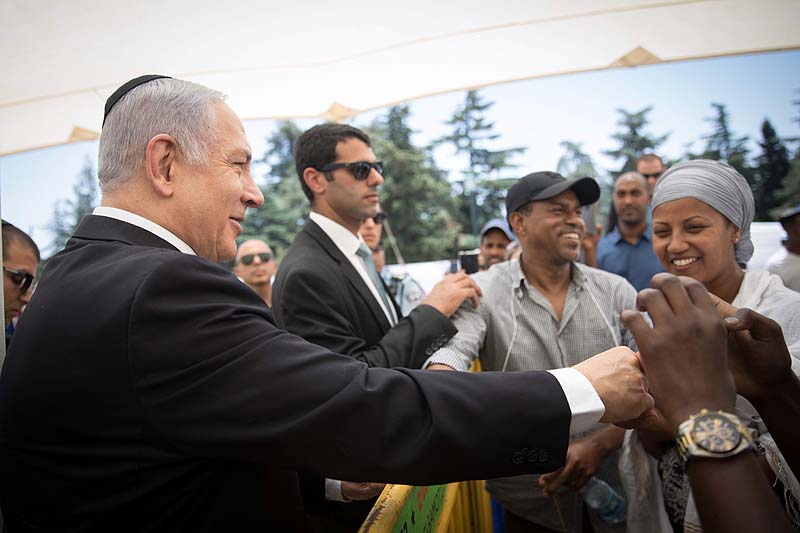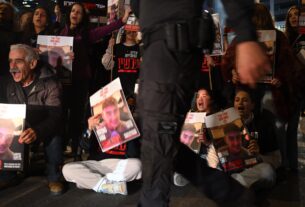Photo Credit: Noam Revkin Fenton/Flash90

A News 12 survey conducted by Mano Geva’s Midgam Institute in collaboration with iPanel, shows the two rival blocs in Israeli politics remaining almost identical to where they were after the September elections, and suggests Israel is stuck deep in the same never-ending political quagmire.
According to News 12, had the elections been held now, Blue&White would have increased its power by 2 seats from the last election and remain the largest party in Israel with 35 seats. Likud would receive the same number of seats it currently holds – 32.
‘);
_avp.push({ tagid: article_top_ad_tagid, alias: ‘/’, type: ‘banner’, zid: ThisAdID, pid: 16, onscroll: 0 });
But a Maariv poll conducted on Thursday shows some movement: if the elections were held now, the rightwing bloc would win 57 seats, while the center-left bloc in collaboration with the Joint Arab List would have 56 seats, with Liberman’s Israel Beiteinu getting 7 seats (down from 8).
A day after the 22nd Knesset was dispersed and Israel was on its way to the elections again, Likud members are preparing for the campaign and the March 2 election day, and analyzing what they did wrong in the previous round in September, according to Channel 12.
In recent days, Prime Minister Benjamin Netanyahu has held a series of meetings with Likud activists to chart his path to victory. One of the clear conclusions of these meetings was to drop the needless investment in Liberman’s Russian immigrant voters. Likud poured millions on the Russian sector, and didn’t produce a single seat.
But Netanyahu believes there are another 4 to 6 seats in the Likud strongholds around the country, which were lost as a result of bad strategy or even complacency.
Channel 12 says Netanyahu intends to borrow a page from his friend Donald J. Trump’s play book and hold mass rallies in Likud-leaning cities around the country, to pull in potential voters who so far didn’t care enough. Likud also wants to put Tel Aviv and the rest of the metro cities in play again, and not concede them to the left. And instead of going after Russians, Likud will focus on the Ethiopians, whom Netanyahu believes could bring in as many as two new Likud seats.
In the Channel 12 poll, the Joint Arab List holds on to its current 13 seats, Liberman’s Israel Beiteinu and Aryeh Deri’s Shas also keep their 8 seats each. United Torah Judaism goes up from 7 to 8 seats. Bennett and Shaked’s New Right gets 6 seats, Labor and the Democratic Camp get only 5 seats each.
According to the same poll, Habayit Hayehudi wins only 2.8% of the votes, and Otzma Yehudit only 1.3%, so neither makes it past the vote threshold of 3.25%.
Finally, the blocs remain roughly the same: the center-left bloc wins 45 seats, compared to the rightwing and Haredi bloc which receives 54 seats. With the support of the Arabs, the leftwing bloc has 58 seats.
The Maariv poll on Thursday revealed a slight advantage for the rightwing camp, but in order to get there the poll invents a yet-to-exist union between Habayit Hayehudi and Otzma Yehudit.
Blue&White led by Benny Gantz gets 35, an increase of 2 seats. Likud, headed by Netanyahu – 33, an increase of one seat. The Joint Arab List loses a mandate and receives only 12. Shas – 8 seats. United Torah Judaism retains its 7 seats. The New Right led by Bennett and Shaked wins 5 seats. The imaginary religious rightwing parties’ alliance receives 4 seats, but barely makes it past the threshold.
This is the first poll in many weeks which shows a Smotrich-Ben-Gvir alliance making it to the Knesset, again, by using the wonderful power of the imagination.
The Labor Party goes down from 6 to 5, and the Democratic camp drops from 5 to 4.
‘);
_avp.push({ tagid: article_top_ad_tagid, alias: ‘/’, type: ‘banner’, zid: ThisAdID, pid: 16, onscroll: 10 });



